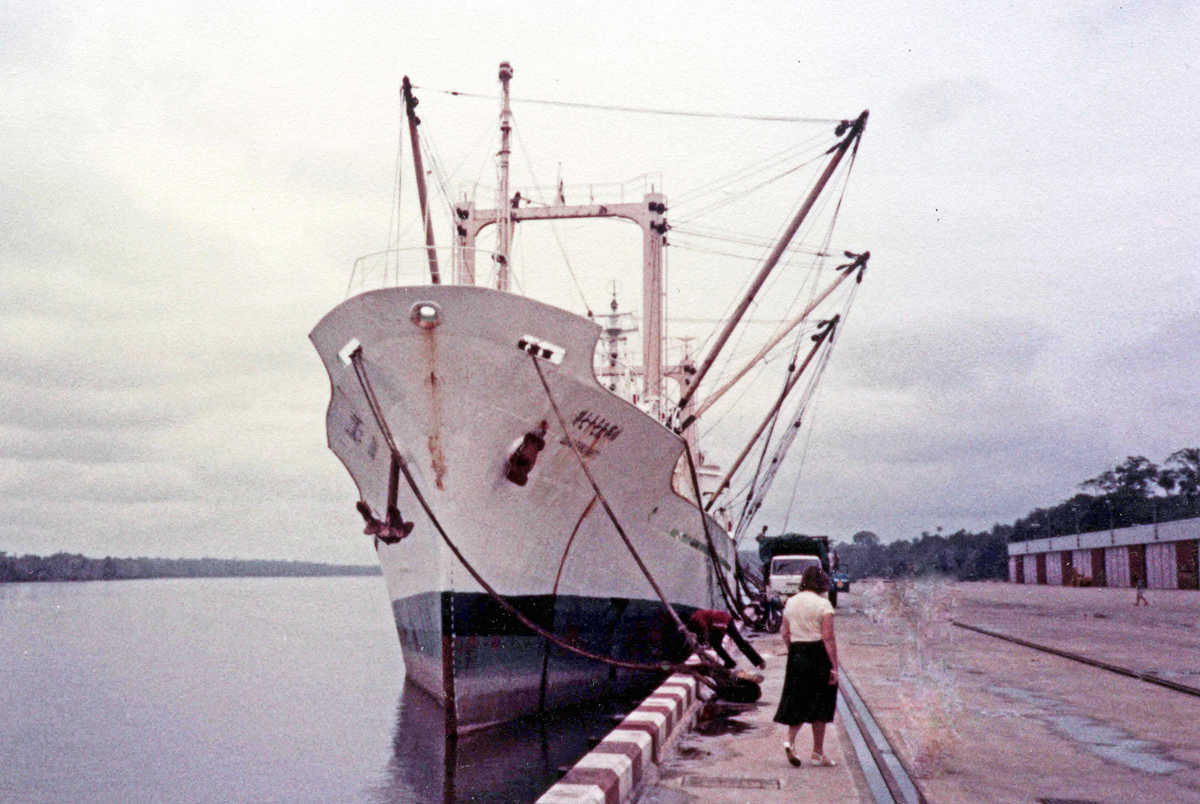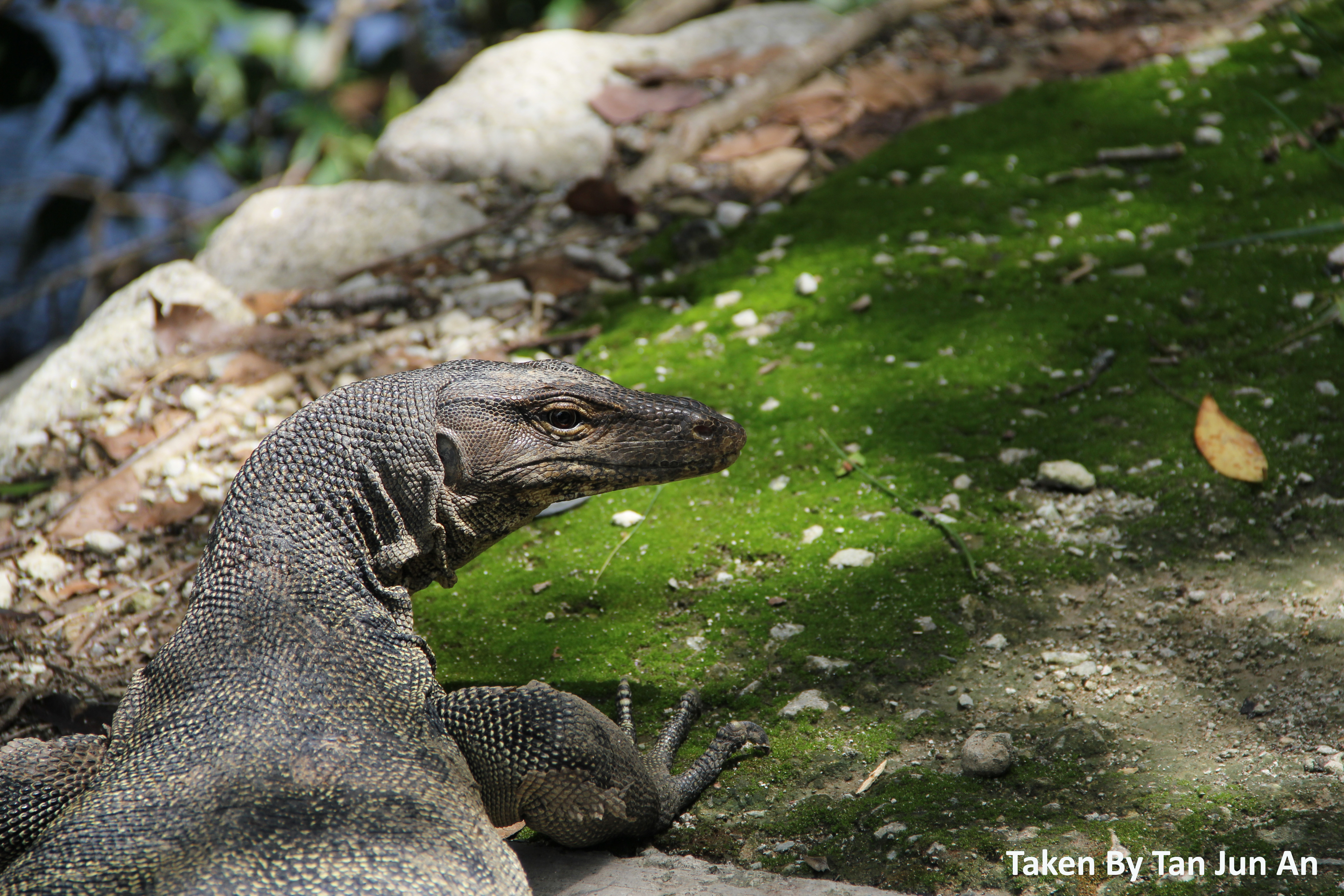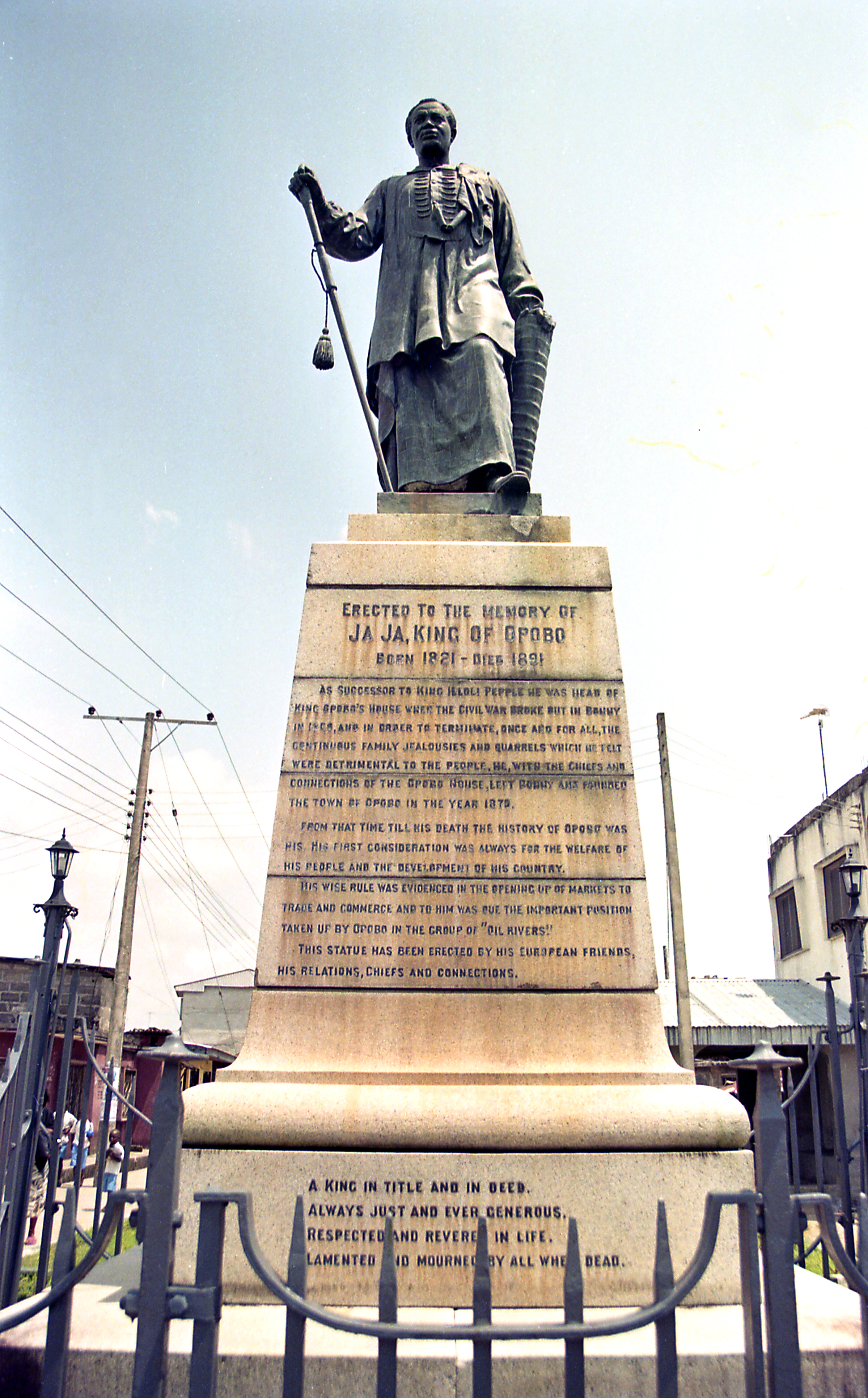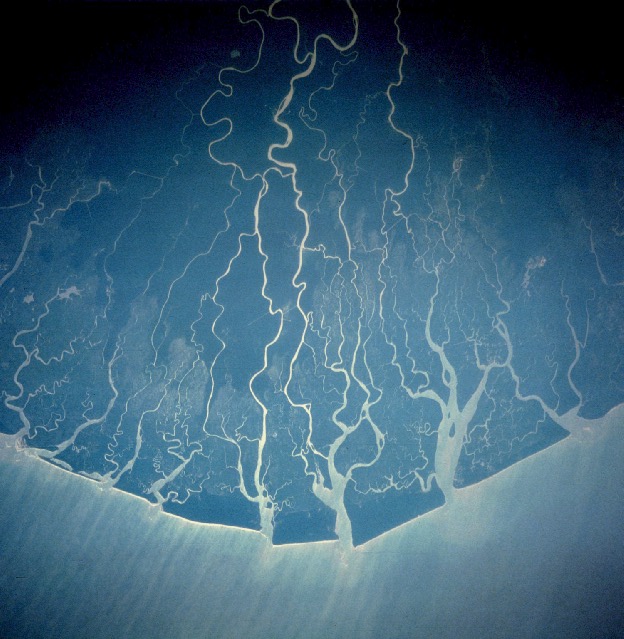|
Aro History
Aro History starts from Ibibio migration to the present Arochukwu area. Ibibio presence Before Igbo arrival in the Aro territory, a group of proto Ibibio migrated to the area and established the Ibom Kingdom during the Bantu expansion. This proto Ibibio group originally came from Usak Edet (Isanguele), a segment of the Ejagham in present-day Southern Cameroon. Igbo migration The Igbo migration led by Eze Agwu clan from Abiriba among the Ibibio in the Aro territory started around the 17th century. Tensions escalated between the Eze Agwu group led by Agwu Inobia and Obong Okon Ita kingdom led by Akpan Okon resulting in the Aro-Ibibio Wars. The Efik were originally from the Ibom Kingdom and might have left before or during the Aro-Ibibio Wars. Neither group had a victorious position in the war. Eze Agwu asked Priest Nnachi of the Edda clan near Afikpo for help. The alliance also supported prince Akakpokpo Okon's coup against his brother Akpan Okon. The war escalated and Nnachi c ... [...More Info...] [...Related Items...] OR: [Wikipedia] [Google] [Baidu] |
Arochukwu
Arochukwu Local Government Area, sometimes referred to as Arochuku or Aro Oke-Igbo, is the third largest local government area in Abia State (after Aba and Umuahia) in southeastern Nigeria and homeland of the Igbo subgroup, Aro people. It is composed of five clans namely Abam, Aro, Ihechiowa, Ututu and Isu. Arochukwu is a principal historic town in Igbo land. It was also one of the cities in the Southern protectorate targeted by the British colonial government. Several historic tourist sites exist in the city. The mystic Ibini Ukpabi shrine, the slave routes and other relics of the slave trade era are frequently visited by tourists. It is also in the food belt of Abia state where most of the staple foods are produced. History Arochukwu was home to a clan of the Ibibios, they founded the early states of Obong Okon Ita and Ibom. Many years passed, migrants that had settled in the area rebelled over the reign of the ruling clan chief in connivance with the younger brother of t ... [...More Info...] [...Related Items...] OR: [Wikipedia] [Google] [Baidu] |
Akakpokpo Okon
Akakpokpo Okon was an Ibibio prince from the Ibom Kingdom around 1690-1720. He was the son of the marriage between the king Obong Okon Ita and an Igbo woman from the Eze Agwu lineage. Akakpokpo Okon lead a successful coup against his brother Akpan Okon the ''Obong'' (king) with the support of the Eze Agwu, Nnachi, and the Nnubi dynasty {{Short description, 17th century tribal dynastic period in West Africa Osim and Akuma Nnubi were brothers and merchant princes of the Akpa people from the east of the Cross River in the late 17th century. The Akpa people were trading allies with ... in the final phases of the Aro-Ibibio Wars. Despite the fact that the coup was successful, Akakpokpo Okon was killed in combat. External links *http://www.aro-okigbo.com/history_of_the_aros.htm *https://web.archive.org/web/20081121232256/http://www.aronetwork.org/others/arohistory.html *https://www.aronewsonline.com/?p=651 Aro people 18th-century Nigerian people Nigerian royalty Ibibio peop ... [...More Info...] [...Related Items...] OR: [Wikipedia] [Google] [Baidu] |
Calabar
Calabar (also referred to as Callabar, Calabari, Calbari and Kalabar) is the capital city of Cross River State, Nigeria. It was originally named Akwa Akpa, in the Efik language. The city is adjacent to the Calabar and Great Kwa rivers and creeks of the Cross River (from its inland delta). Calabar is often described as the tourism capital of Nigeria, especially due to several initiatives implemented during the administration of Donald Duke as governor of Cross River State (1999–2007), which made the city the cleanest and most environmentally friendly city in Nigeria. Administratively, the city is divided into Calabar Municipal and Calabar South Local Government Areas. It has an area of and a population of 371,022 as at 2006 census. History Calabar was the name given by the Portuguese discoverers from the 15th century to the tribes on this part of the Guinea coast at the time of their arrival, when the present inhabitants in the district were the Quas. It was not till th ... [...More Info...] [...Related Items...] OR: [Wikipedia] [Google] [Baidu] |
Brass, Nigeria
Brass is a Local Government Area in Bayelsa State, southern Nigeria. Its headquarters are in the town of Twon-Brass on Brass Island along the coast, it has a coastline of approximately 90 km on the Bight of Bonny. Much of the area of the LGA is occupied by the Edumanom National Forest. It has an area of 1,404 km and a population of 185,049 at the 2006 census. The postal code of the area is 562. It is a traditional fishing village of the Nembe branch of the Ijo people, it became a slave-trading port for the state of Brass (Nembe) in the early 19th century. It was ruled by African merchant “houses,” which were encouraged by the European traders, the state’s chief slave-collecting centres (Brass and Nembe) often sent war canoes into the interior—especially through Igbo country—to capture slaves. Economy of Brass Brass has enormous deposits of crude oil and natural gas and because of the rich natural resources has the presence of several national and ... [...More Info...] [...Related Items...] OR: [Wikipedia] [Google] [Baidu] |
Kingdom Of Bonny
The Kingdom of Bonny, otherwise known as Grand Bonny, is a traditional state based on the town of Bonny in Rivers State, Nigeria. In the pre-colonial period, it was an important slave trading port, later trading palm oil products. During the 19th century the British became increasingly involved in the internal affairs of the kingdom, in 1886 assuming control under a protectorate treaty. Today the King of Bonny has a largely ceremonial role. Introduction Bonny Kingdom was founded by Ndoli, a man from the Isedani lineage of Kolokuma in the Ebeni-toru region (in the present day Kolokuma/Opokuma Local Government Area of Bayelsa State. The Kingdom was founded before or about 1000 AD. Its modern name, "Bonny", is a corruption of the original ''Ubani''. An alternative name, ''Okoloama'' (lit. "The Island of Curlews"), is also widely used. The hereditary king, the ''Amanyanabo'', originated from the bloodline of the earliest kings of Bonny. The subsequent monarchs of the kingdom have ... [...More Info...] [...Related Items...] OR: [Wikipedia] [Google] [Baidu] |
Opobo
Opobo is a community in Rivers State, in the South South region of Nigeria. The kingdom was founded in 1870 by Jubo Jubogha, popularly known as JaJa, an Igbo man who owned slaves. The native language of Opobo is the Ibani language that is spoken in Bonny. A greater part of the city state is still referred to as Opobo in Rivers State. Opobo is made up of several islands and communities which is in Opobo–Nkoro Local Government Area in the South South Senatorial District of Rivers State Nigeria. The communities include Opobo Town, which is its headquarters, Queenstown, Kalasunju, Oloma, Ayaminimah, Iloma, Minimah, Okpukpo, Iwoma, Ekereborokiri, Kalaibiama, Epelema, Ozuobulu, Muma Down Below, Inokiri and Abazibie. Opobo's geologic setting is similar to the coastal and estuarine settlements of the Niger Delta region. It is located at the mouth of the Imo River, one of the main estuaries that break the Nigerian coastline. The approximate geographical co-ordinates of the kingdom are 04 ... [...More Info...] [...Related Items...] OR: [Wikipedia] [Google] [Baidu] |
Palm Oil
Palm oil is an edible vegetable oil derived from the mesocarp (reddish pulp) of the fruit of the oil palms. The oil is used in food manufacturing, in beauty products, and as biofuel. Palm oil accounted for about 33% of global oils produced from oil crops in 2014. Palm oils are easier to stabilize and maintain quality of flavor and consistency in processed foods, so are frequently favored by food manufacturers. On average globally, humans consumed 7.7 kg (17 lb) of palm oil per person in 2015. Demand has also increased for other uses, such as cosmetics and biofuels, creating more demand on the supply encouraging the growth of palm oil plantations in tropical countries. The use of palm oil has attracted the concern of environmental groups due to deforestation in the tropics where palms are grown, and has been cited as a factor in social problems due to allegations of human rights violations among growers. An industry group formed in 2004 to create more sustainable and et ... [...More Info...] [...Related Items...] OR: [Wikipedia] [Google] [Baidu] |
Niger Delta
The Niger Delta is the delta of the Niger River sitting directly on the Gulf of Guinea on the Atlantic Ocean in Nigeria. It is located within nine coastal southern Nigerian states, which include: all six states from the South South geopolitical zone, one state (Ondo) from South West geopolitical zone and two states (Abia and Imo) from South East geopolitical zone. The Niger Delta is a very densely populated region sometimes called the Oil Rivers because it was once a major producer of palm oil. The area was the British Oil Rivers Protectorate from 1885 until 1893, when it was expanded and became the Niger Coast Protectorate. The delta is a petroleum-rich region and has been the center of international concern over pollution that has resulted principally from major oil spills of multinational corporations of the petroleum industry. Geography The Niger Delta, as now defined officially by the Nigerian government, extends over about and makes up 7.5% of Nigeria's land mass. H ... [...More Info...] [...Related Items...] OR: [Wikipedia] [Google] [Baidu] |
Aro Confederacy
The Aro Confederacy (1690–1902) was a political union orchestrated by the Aro people, Igbo subgroup, centered in Arochukwu in present-day southeastern Nigeria. Their influence and presence was all over Eastern Nigeria, lower Middle Belt, and parts of present-day Cameroon and Equatorial Guinea during the 18th and 19th centuries. The Arochukwu Kingdom was an economic, political, and an oracular center as it was home of the Ibini Ukpabi oracle, High Priests, the Aro King ''Eze Aro'', and central council (Okpankpo). Rise By the mid-18th century, several Aro business families had migrated to the Igbo hinterland and to adjacent areas as a result of the rise of the demand for slaves by Europe and for palm oil. This migration and their military power supported by their alliances with several related neighboring Igbo and eastern Cross River militarized states (particularly Ohafia, Edda, Abam, Abiriba, Afikpo, Ekoi, Bahumono, Amasiri etc.), quickly established the Aro Confederacy ... [...More Info...] [...Related Items...] OR: [Wikipedia] [Google] [Baidu] |
Abam
Abam is a populated clan in Abia State, Abia state. It is located in Arochukwu/Ohafia federal constituency of Nigeria. Abam is a brother clan to Ohafia. The progenitor of the people of Abam is known as Onyerubi Atita. As a people, Abam clan in Abia State, Abia state is sometimes referred to as Abam Onyerubi. Abam in Abia State, Abia state is made up of 26 villages. Some of the villages are: Ndiebe Abam, Ozu Abam, Idima Abam, Amaeke Abam, Ndi Oji Abam, Amelu Abam, Amuru Abam, Amaogbu Abam, Atan Abam, Ndi Okereke Abam, Ndi Ojugwo Abam, Ndi Inya Abam, Ndi Mmeme Abam, Ndi Agwu Abam and others. There are other communities and towns in other parts of Eastern Nigeria, that trace their ancestry to Abam. Some of them are: Umuhu in Abia State, Abia state, Ndoro (town), Ndoro in Abia State, Abia state, Abba in Imo State, Imo state, Abam Ubakala in Abia State, Abia state, Abam Azia (town), Azia in Anambra State, Anambra state and others. References {{Reflist Ethnic groups in Nigeri ... [...More Info...] [...Related Items...] OR: [Wikipedia] [Google] [Baidu] |
Ohafia
Ohafia is an Igbo town in the Ohafia local government area (LGA) in Abia State, Nigeria. It is an Igbo speaking region. The ancestral capital of Ohafia town is the centrally located village of Elu. Ohafia Local Government Area, is an administrative jurisdiction assigned by the Nigeria Government, which covers the entire Ohafia villages and other towns such as Abiriba and Nkporo, with its Administrative Headquarters at Ebem Ohafia. The ancestors of the Ohafia people were renowned as mighty warriors. This aspect of the Ohafia peoples' history remains fundamental to the Ohafia people's sense of identity. The knitted warrior's cap or "leopard cap" () is well known and is an associated product of Ohafia. The Ohafia warrior tradition is embodied in the performance of '' iri agha''. Ohafia is home to the third largest military base in Nigeria, named Goodluck Jonathan Barracks after Nigeria's former President - Goodluck Jonathan. It houses the headquarters of the newly established 14 Bri ... [...More Info...] [...Related Items...] OR: [Wikipedia] [Google] [Baidu] |
City-states
A city-state is an independent sovereign city which serves as the center of political, economic, and cultural life over its contiguous territory. They have existed in many parts of the world since the dawn of history, including cities such as Rome, Athens, Sparta, Carthage, and the Italian city-states during the Middle Ages and Renaissance, such as Florence, Venice, Genoa and Milan. With the rise of nation states worldwide, only a few modern sovereign city-states exist, with some disagreement as to which qualify; Monaco, Singapore and Vatican City are most commonly accepted as such. Singapore is the clearest example, with full self-governance, its own currency, a robust military and a population of 5.5 million. Several non-sovereign cities enjoy a high degree of autonomy and are sometimes considered city-states. Hong Kong, Macau, and members of the United Arab Emirates—most notably Dubai and Abu Dhabi—are often cited as such. Historical background Ancient and medieva ... [...More Info...] [...Related Items...] OR: [Wikipedia] [Google] [Baidu] |





